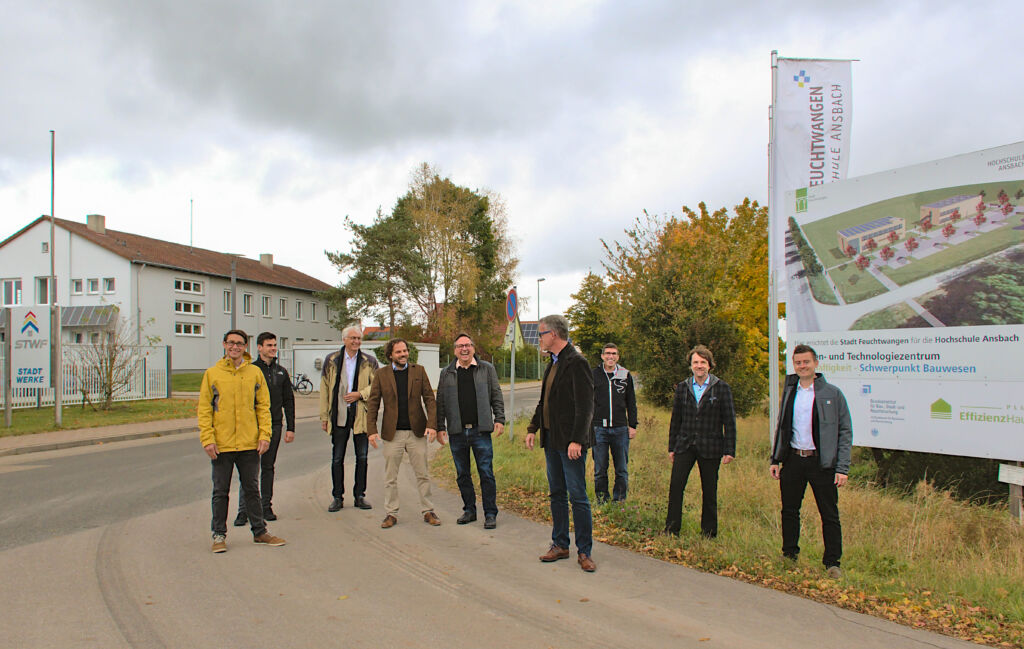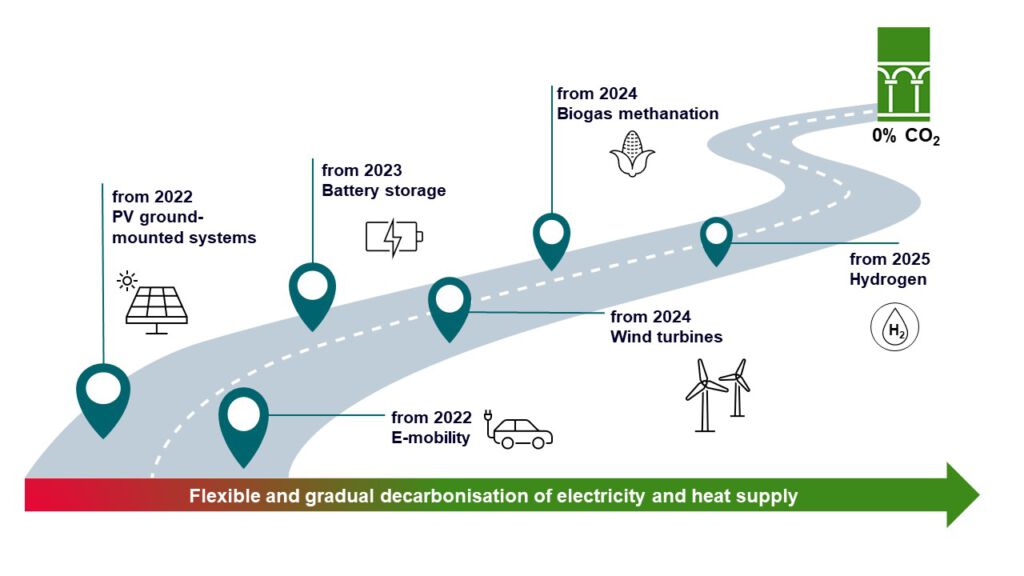CO2-free by 2035 with PV, wind, storage and digitisation
Results of the decarbonisation study presented – goal: Feuchtwangen climate neutral by 2035
Investments in photovoltaic (PV) and wind power plants as well as in energy storage systems are essential milestones towards a carbon-free energy supply of our own, which Stadtwerke Feuchtwangen is striving for in the near future. This is proven by the results of the groundbreaking decarbonisation study, which have now also been presented to the works committee.
The holistic study was developed by the municipal utilities together with the neighbouring Campus Feuchtwangen, a branch of Ansbach University of Applied Sciences, and Siemens AG. It shows how energy supply in the electricity, heat and mobility sectors can be designed to be CO2-free and sustainable. Based on surveys and analyses, a structured energy concept with concretely formulated goals for cost-efficient energy supply was created. “In order to achieve our goal of an almost self-sufficient, climate-neutral energy supply for the entire Feuchtwangen area in a timely manner, we must inevitably invest in the further expansion of PV and wind energy,” was the final conclusion of Feuchtwangen’s first mayor Patrick Ruh. The study proves that these technologies are “technically and economically absolutely sensible and promising for the future” for the Feuchtwangen municipal utility. At the same time, the people of Feuchtwangen expect an energy conversion from the purchase of fossil fuels to more regional, CO2-free energy production in order to counteract the rising costs of electricity and heat and to be able to build on price stability, as the citizens’ survey conducted in autumn 2021 shows. “With this knowledge and confirmation, we can now move purposefully into the operational phase and implement corresponding projects,” informed the technical municipal utility manager Lothar Beckler.
From 2030, Stadtwerke Feuchtwangen wants to offer its customers only locally generated green electricity. The energy demand analysis up to the year 2035, which was prepared as part of the study, forecasts steadily increasing electricity consumption due to increasing electrification through electric vehicles and heat pumps. “To ensure that the electricity is always available when it is needed, additional energy storage systems are needed in addition to PV and wind plants,” expressed Thomas Haupt, research assistant at the campus, evaluating the use of a battery storage system as a sensible instrument for the Feuchtwangen municipal utility based on an initial profitability analysis. “Battery storage systems play a decisive role in self-sufficiency for regions with a high proportion of PV and wind generation and also offer attractive opportunities to participate in the energy market in order to generate additional revenues there,” emphasised Dr. Rainer Saliger, an expert in energy storage at Siemens. According to Saliger, such investments have a high return on investment and can certainly pay for themselves after around ten years. “We have to be able to make investments in this area in order to be able to operate sustainably in the long term,” added Mayor Patrick Ruh. Politically, there is definitely support for this in the cloistered city, “even though we are of course aware that such plants always meet with discussions and different opinions,” Ruh clarified.
In the heating sector, Stadtwerke Feuchtwangen wants to be completely carbon neutral by 2035 at the latest. “With a combination of electrification by means of heat pumps and direct power processes, locally produced biomethane as well as admixing hydrogen, the municipal utilities could completely cover the natural gas demand in the Feuchtwangen area and thus become independent of energy imports,” Dr. Gerd Hofmann, project coordinator at the campus, explained his analysis results. As Lothar Beckler added, intensive talks are already underway with operators of local biogas plants regarding their own regional production of biogas and the goal of a self-sufficiency rate of over 80 percent.
“The results of the study are already meeting with keen interest from local industrial companies and neighbouring communities to help shape the region’s decarbonisation path,” Beckler said. “Now it is important to drive forward incentives and further accompanying measures with the citizens and industry on the basis of the custom-fit and holistic concept,” emphasised Campus Director Prof. Dr.-Ing. Johannes Jungwirth. It is clear that the surrounding rural area is very important for the CO2-free supply of the urban area. “With this initiative, Feuchtwangen is one of the pioneer municipalities in the whole of Germany,” clarified Matthias Hammerl, project manager at Siemens. “Together with these pioneers, we are optimising the technological kit for the energy future, which is likely to be used in many regions in Germany in the next few years. But then Feuchtwangen will already be quite a bit further along the path of decarbonisation, on which we are happy to accompany the municipal utilities, town and region with advice and action.”

The participants in the decarbonisation study of Stadtwerke Feuchtwangen, from the left: Dr. Gerd Hofmann and Thomas Haupt from Campus Feuchtwangen, Dr. Christoph Nölscher, Campus Director Prof. Dr.-Ing. Johannes Jungwirth, Stadtwerke manager Lothar Beckler, Feuchtwangen's first mayor Patrick Ruh, Ralf Hübsch from Stadtwerke , and Dr. Rainer Saliger and Matthias Hammerl from Siemens.

